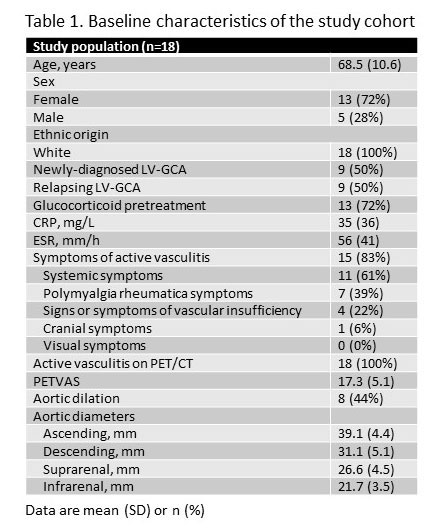Session Information
Date: Saturday, November 12, 2022
Title: Vasculitis – Non-ANCA-Associated and Related Disorders Poster I: Giant Cell Arteritis
Session Type: Poster Session A
Session Time: 1:00PM-3:00PM
Background/Purpose: To evaluate the clinical and functional/morphological imaging response in a series of active large vessel (LV)-GCA patients treated with tocilizumab (TCZ) monotherapy after ultra-short-term glucocorticoids (GCs).
Methods: In this single-arm, single center, open-label clinical trial we enrolled patients with active LV-GCA according to the following criteria:
PET/CT showing vascular FDG uptake ≥2 in at least one vascular district and at least one among
1. ESR >40 mm/h or CRP >10 mg/L
2. Cranial or systemic manifestations of GCA or polymyalgia rheumatica (PMR)
Patients taking more than 10 mg/day of prednisone (or equivalent) for more than 10 consecutive days in the previous three months were excluded.
All patients received 500 mg per day methylprednisolone intravenously for three consecutive days, and weekly subcutaneous TCZ injections from day 3 until week 52. PET/CT was performed in all patients at baseline and at week 24 and 52. PETVAS was calculated by one nuclear medicine specialist, and the diameters of the aorta were measured by a radiologist at 4 different levels. Any change of ≥5mm on serial CT was considered significant progression of vascular damage. Remission was defined as the absence of any clinical symptoms directly attributable to GCA, including normalization of CRP and ESR, and absence of new/worsened vascular damage at CT.
The primary endpoints were the reduction of PETVAS at week 24 and 52 compared with baseline and the proportion of patients with relapse-free remission at week 24 and 52. Secondary endpoint was the proportion of patients with aortic dilation at week 24 and 52. This study is registered with ClinicalTrials.gov, NCT05394909.
Results: From March 2019 to November 2020 18 patients were included. Baseline characteristics of the study cohort are reported in Table 1. Compared to baseline value, a significant reduction of PETVAS was observed at week 24 and 52 (Table 2). 13 of 18 patients (72%, 95% CI 47-90) achieved relapse-free remission at week 24, and 10 (56%, 95% CI 31-78) maintained relapse-free remission until week 52. At week 24 and 52 no patient showed new aortic dilation. However, 3 dilated patients at baseline showed significant increase of aortic diameter (≥5 mm) at week 24, and one further dilated patient showed significant increase of aortic diameter at week 52. Overall, 2 (11%) of 18 patients did not respond to treatment, and rescue GC treatment was necessary. One patient discontinued TCZ at week 44 because of adverse event (cutaneous rash), and one patient received TCZ every other week due to recurring neutropenia. One patient underwent aortic aneurysm surgical repair at week 44.
Conclusion: Ultra-short GCs and TCZ controlled the clinical symptoms of GCA, lowered acute phase responses and led to a significant reduction of vascular inflammation in many patients with active LV-GCA. Four of 18 patients (22%) showed significant increase in aortic diameters on serial CT. The effect of TCZ on progression of aortic damage needs larger prospective studies.
To cite this abstract in AMA style:
Muratore F, Cassone G, Marvisi C, GALLI E, Boiardi L, BESUTTI G, Spaggiari L, CASALI M, Mancuso P, Versari A, Giorgi Rossi P, Salvarani C. Treatment of Giant Cell Arteritis Patients with Ultra-short Glucocorticoids and Tocilizumab: Role of Imaging in a Prospective Study [abstract]. Arthritis Rheumatol. 2022; 74 (suppl 9). https://acrabstracts.org/abstract/treatment-of-giant-cell-arteritis-patients-with-ultra-short-glucocorticoids-and-tocilizumab-role-of-imaging-in-a-prospective-study/. Accessed .« Back to ACR Convergence 2022
ACR Meeting Abstracts - https://acrabstracts.org/abstract/treatment-of-giant-cell-arteritis-patients-with-ultra-short-glucocorticoids-and-tocilizumab-role-of-imaging-in-a-prospective-study/


